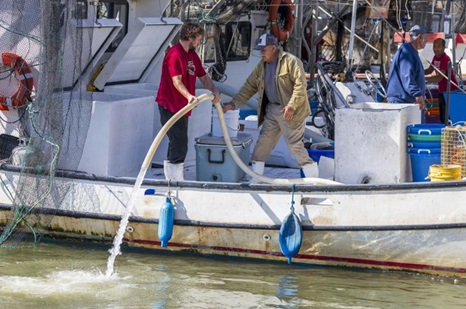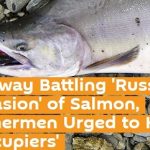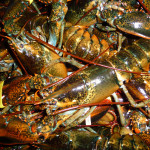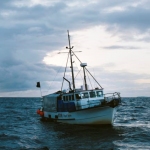Tag Archives: Louisiana
As other industries bristle, Louisiana shrimpers voice support for tariffs
 Louisiana shrimpers have spent years trying to keep their industry afloat amid a flood of cheap imported shrimp. They think the sweeping new tariffs announced this week could help, though they are still pushing for a more permanent solution. “If you break down you can’t even afford to put your boat back out, that’s how serious it is,” said Acy Cooper, President of the Louisiana Shrimp Association. In his decades as a commercial shrimper, he has seen the price of local shrimp plummet. “Last year, we had more closures and lower prices than we’ve ever had before,” he said. While leaders of other industries worry about the impact of the tariffs announced by President Trump this week, he expects them to help shrimpers like him compete in U.S. markets. Video, more, >>CLICK TO READ<< 08:03
Louisiana shrimpers have spent years trying to keep their industry afloat amid a flood of cheap imported shrimp. They think the sweeping new tariffs announced this week could help, though they are still pushing for a more permanent solution. “If you break down you can’t even afford to put your boat back out, that’s how serious it is,” said Acy Cooper, President of the Louisiana Shrimp Association. In his decades as a commercial shrimper, he has seen the price of local shrimp plummet. “Last year, we had more closures and lower prices than we’ve ever had before,” he said. While leaders of other industries worry about the impact of the tariffs announced by President Trump this week, he expects them to help shrimpers like him compete in U.S. markets. Video, more, >>CLICK TO READ<< 08:03
Shreveport restaurants found misleading diners with imported shrimp
 A new report has cast a harsh spotlight on Shreveport’s restaurant scene, revealing that more than half of sampled eateries are misleading customers about the origin of their shrimp. Genetic testing conducted earlier this month found that 58% of the 24 sampled restaurants falsely advertised or implied that their shrimp were wild-caught from the Gulf of Mexico, when in fact they were serving farm-raised imports. The investigation, commissioned by the Louisiana Shrimp Task Force and carried out by SEAD Consulting, uncovered the highest mislabeling rate in the state to date. Six restaurants went a step further, explicitly labeling their dishes as “Gulf shrimp” despite serving foreign-sourced seafood. “This is not just about a menu mistake. This is food fraud,” said John Williams, executive director of the Southern Shrimp Alliance. “Consumers believe they’re supporting local fishermen and eating a premium, domestic product. Instead, they’re being served something entirely different — often at the same price.” more, >>CLICK TO READ<< 13:45
A new report has cast a harsh spotlight on Shreveport’s restaurant scene, revealing that more than half of sampled eateries are misleading customers about the origin of their shrimp. Genetic testing conducted earlier this month found that 58% of the 24 sampled restaurants falsely advertised or implied that their shrimp were wild-caught from the Gulf of Mexico, when in fact they were serving farm-raised imports. The investigation, commissioned by the Louisiana Shrimp Task Force and carried out by SEAD Consulting, uncovered the highest mislabeling rate in the state to date. Six restaurants went a step further, explicitly labeling their dishes as “Gulf shrimp” despite serving foreign-sourced seafood. “This is not just about a menu mistake. This is food fraud,” said John Williams, executive director of the Southern Shrimp Alliance. “Consumers believe they’re supporting local fishermen and eating a premium, domestic product. Instead, they’re being served something entirely different — often at the same price.” more, >>CLICK TO READ<< 13:45

Louisiana Shrimpers Are Fighting To Preserve A Historic Gulf Industry
It’s hard to nail down Dino Pertuit. I finally catch the Louisiana seafood legend early in the morning, and we chat while he drives back from a shrimping expedition, the phone call dropping at least three times along the way. His rich Cajun accent and the rumblings of his truck in the background make it hard for me to decipher everything he’s saying. But one sentence stands out crystal clear: “I’m going to do it until I die,” he says of shrimping. And at 57 years old, he’s one of the younger ones who keep it going. A third-generation shrimper, Pertuit has watched as prices for his Gulf catch have stagnated, but the hard work of harvesting it has stayed the same. He says his shrimp commanded about $3.50 a pound in the 1980s and today they still hover around that price—while the costs for everything else, like fuel and boat insurance, have only gone up. His product remains highly coveted; he supplies shrimp to many of New Orleans’ top restaurants, including Herbsaint and Cochon. Photos, more, >>CLICK TO READ<< 06:29

St. Bernard couple’s shrimp boat takes them on a 5-month, 6,000-mile journey around Great Loop
If this were a romantic comedy, it would be called “Tracy and Stacie’s Big Adventure.” If it were a seafaring adventure novel, the title could be “Around the Loop in 125 Days.” Whatever you call it, the five-month nautical journey that St. Bernard residents Tracy and Stacie Alfonso recently completed was the trip of a lifetime. Now the couple is home and their shrimp boat docked once again at Delacroix Island after completing the 6,000-mile Great Loop. Tracy Alfonso, who grew up in a commercial fishing family and shrimped all of his life, had dreamed of navigating the Great Loop since he heard about it. Called the greatest boat adventure in North America, the journey entails circumnavigating much of the United States and parts of Canada. Photos, more, >>CLICK TO READ<< 13:03
Investing in Innovation: How Louisiana’s Menhaden Industry is Leading in Sustainability
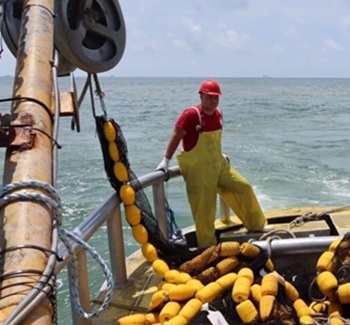 Louisiana’s menhaden industry plays a critical role in the state’s coastal economy, providing jobs and generating millions in economic impact. Together, the industry supports over 2,000 direct and indirect workers, providing good wage jobs in rural coastal communities and contributing $25 million to state and local economies. In a state where commercial fishing is a backbone of our culture, these jobs help keep coastal communities alive. At the same time, we recognize our responsibility as stewards of the Gulf menhaden resource and have taken proactive steps to ensure the sustainability of our fishery. more, >>CLICK TO READ<< 06:54
Louisiana’s menhaden industry plays a critical role in the state’s coastal economy, providing jobs and generating millions in economic impact. Together, the industry supports over 2,000 direct and indirect workers, providing good wage jobs in rural coastal communities and contributing $25 million to state and local economies. In a state where commercial fishing is a backbone of our culture, these jobs help keep coastal communities alive. At the same time, we recognize our responsibility as stewards of the Gulf menhaden resource and have taken proactive steps to ensure the sustainability of our fishery. more, >>CLICK TO READ<< 06:54
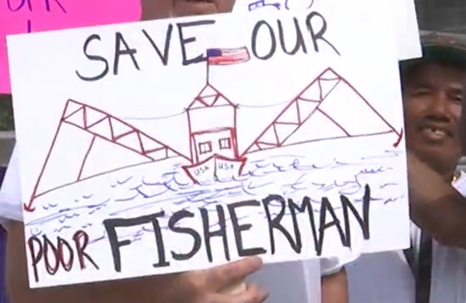
Save Our Shrimpers Act reintroduced to prevent taxpayer dollars from being used to fund foreign shrimp
Recent findings by the Southern Shrimp Alliance uncovered that United States taxpayer dollars were being used to finance foreign shrimp operations through international financial institutions. Cheri Blanchard is a Louisiana board member with the Southern Shrimp Alliance. “We find these situations like we’ve been ringing the bell about the World Bank and about international financing going into foreign shrimp aquaculture and with taxpayer money,” said Blanchard. “The value of U.S. Shrimp has been cut in half from 2021 to 2023, and it’s still about that value because people have had to tie up their boats,” she said. Video, more, >>CLICK TO READ<< 06:08
Commercial Fisherman Wilbert “Ben” Danos of Larose, Louisiana, has passed away
 Wilbert “Ben” Danos, 95, a native and resident of Larose, passed away peacefully on Thursday, March 6, 2025, surrounded by his loving family. Mr. Ben spent his life on the water first as a tugboat captain then became a commercial fisherman. He, with his wife Ruth as his deckhand, trawled for many years proudly creating their legacy of 3 generations of fishermen. He loved his grandchildren and great-grandchildren deeply as they did him. He will be missed by all those who knew and loved him. more, >>CLICK TO READ<< 17:22
Wilbert “Ben” Danos, 95, a native and resident of Larose, passed away peacefully on Thursday, March 6, 2025, surrounded by his loving family. Mr. Ben spent his life on the water first as a tugboat captain then became a commercial fisherman. He, with his wife Ruth as his deckhand, trawled for many years proudly creating their legacy of 3 generations of fishermen. He loved his grandchildren and great-grandchildren deeply as they did him. He will be missed by all those who knew and loved him. more, >>CLICK TO READ<< 17:22
Four Lafayette seafood restaurants found potentially noncompliant with Louisiana shrimp labeling laws
 A recent study by SeaD Consulting found that four Lafayette-area seafood restaurants are misrepresenting their shrimp menu items to the public. SeaD Consulting partners with the seafood industry and academic and governmental institutions to conduct genetic testing of seafood species, in order to uncover labeling and substitution fraud in restaurants. On Feb. 27, SeaD released the results of their investigation into the Lafayette-area market. After conducting random genetic testing on shrimp dishes from 24 local restaurants, the group found that 33% of the sampled restaurants are serving farm-raised imported shrimp. more, >>CLICK TO READ<< 09:26
A recent study by SeaD Consulting found that four Lafayette-area seafood restaurants are misrepresenting their shrimp menu items to the public. SeaD Consulting partners with the seafood industry and academic and governmental institutions to conduct genetic testing of seafood species, in order to uncover labeling and substitution fraud in restaurants. On Feb. 27, SeaD released the results of their investigation into the Lafayette-area market. After conducting random genetic testing on shrimp dishes from 24 local restaurants, the group found that 33% of the sampled restaurants are serving farm-raised imported shrimp. more, >>CLICK TO READ<< 09:26
The History of the Louisiana Menhaden Industry
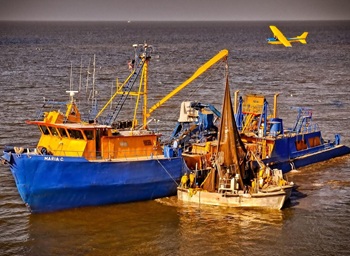 Few people realize that one of Louisiana’s most valuable fisheries isn’t for shrimp, oysters, or crab—but for a small, unassuming fish that has fueled our state and local economies: the menhaden. The first large-scale menhaden fishery in the U.S. began on the East Coast in the early 1800s, where the fish were processed for oil and fertilizer. By the late 19th century, the industry expanded into the Gulf, where Louisiana’s nutrient-rich estuaries provided an ideal habitat for vast menhaden populations. Processing plants soon emerged along the coast, and by the early 20th century, the Gulf menhaden fishery was a booming industry, supplying fish oil for industrial uses and fish meal for livestock feed. more, >>CLICK TO READ<< 07:03
Few people realize that one of Louisiana’s most valuable fisheries isn’t for shrimp, oysters, or crab—but for a small, unassuming fish that has fueled our state and local economies: the menhaden. The first large-scale menhaden fishery in the U.S. began on the East Coast in the early 1800s, where the fish were processed for oil and fertilizer. By the late 19th century, the industry expanded into the Gulf, where Louisiana’s nutrient-rich estuaries provided an ideal habitat for vast menhaden populations. Processing plants soon emerged along the coast, and by the early 20th century, the Gulf menhaden fishery was a booming industry, supplying fish oil for industrial uses and fish meal for livestock feed. more, >>CLICK TO READ<< 07:03
On Louisiana’s coast, communities embrace ‘Gulf of America’ rebrand
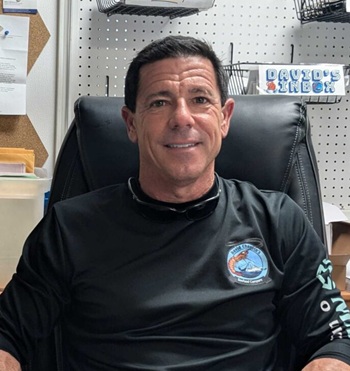 Sitting in the business office next to his boat dock and shrimp processing plant, David Chauvin couldn’t be more excited about the Gulf of Mexico’s rebrand to the Gulf of America. Chauvin is already scrawling Gulf of America on his seafood companies’ invoices. Last week, he submitted a trademark application for a new Gulf of America logo he plans to use on his shrimp packaging later this year. Chauvin’s life is intimately tied to, and almost entirely dependent on the gulf. His family businesses include David Chauvin Seafood, Bluewater Shrimp and Chicky Lou’s. They cover nearly all the stages of getting shrimp from the gulf to people’s plates. The companies sell fresh shrimp wholesale and through a retail store. They also peel, process and freeze shrimp, and supply shrimp boats with fuel and ice. Photos, more, >>CLICK TO READ<< 07:18
Sitting in the business office next to his boat dock and shrimp processing plant, David Chauvin couldn’t be more excited about the Gulf of Mexico’s rebrand to the Gulf of America. Chauvin is already scrawling Gulf of America on his seafood companies’ invoices. Last week, he submitted a trademark application for a new Gulf of America logo he plans to use on his shrimp packaging later this year. Chauvin’s life is intimately tied to, and almost entirely dependent on the gulf. His family businesses include David Chauvin Seafood, Bluewater Shrimp and Chicky Lou’s. They cover nearly all the stages of getting shrimp from the gulf to people’s plates. The companies sell fresh shrimp wholesale and through a retail store. They also peel, process and freeze shrimp, and supply shrimp boats with fuel and ice. Photos, more, >>CLICK TO READ<< 07:18
U.S. Coast Guard Rescues Three Fishermen Off Louisiana
 On Thursday, the U.S. Coast Guard rescued three people from a fishing vessel that capsized off the coast of Louisiana. At about 0830 hours on Thursday morning, Eighth Coast Guard District received an EPIRB alert from a fishing vessel located about 40 miles off Calibou Bay. The watchstanders issued a broadcast requesting help from merchant vessels and diverted a nearby Ocean Sentry aircrew to the scene. The aircrew spotted the boat, which was partially sunken, and a life raft floating near it. Photos, Video, more, >>CLICK TO READ<< 11:07
On Thursday, the U.S. Coast Guard rescued three people from a fishing vessel that capsized off the coast of Louisiana. At about 0830 hours on Thursday morning, Eighth Coast Guard District received an EPIRB alert from a fishing vessel located about 40 miles off Calibou Bay. The watchstanders issued a broadcast requesting help from merchant vessels and diverted a nearby Ocean Sentry aircrew to the scene. The aircrew spotted the boat, which was partially sunken, and a life raft floating near it. Photos, Video, more, >>CLICK TO READ<< 11:07
Should Trump levy tariffs to protect this Louisiana industry? Clay Higgins asks for help
 Acadiana Congressman Clay Higgins has asked President Trump to increase tariffs and trade enforcement on shrimp, crawfish and other imported seafood to protect one of Louisiana signature industries. Louisiana is the second-largest seafood producing state behind only Alaska.“Domestic shrimpers, fishermen, and crawfish producers in Louisiana and across the country face significant challenges competing against foreign seafood industries that are heavily subsidized and engage in illegal dumping into the United States,” Higgins wrote in a letter to Trump. “These unrighteous trade practices artificially drive down prices, disrupt fair market conditions, and threaten the livelihoods of hardworking American seafood producers. more. >>CLICK TO READ<< 15:05
Acadiana Congressman Clay Higgins has asked President Trump to increase tariffs and trade enforcement on shrimp, crawfish and other imported seafood to protect one of Louisiana signature industries. Louisiana is the second-largest seafood producing state behind only Alaska.“Domestic shrimpers, fishermen, and crawfish producers in Louisiana and across the country face significant challenges competing against foreign seafood industries that are heavily subsidized and engage in illegal dumping into the United States,” Higgins wrote in a letter to Trump. “These unrighteous trade practices artificially drive down prices, disrupt fair market conditions, and threaten the livelihoods of hardworking American seafood producers. more. >>CLICK TO READ<< 15:05
Louisiana: Rep. Higgins asks President Trump for seafood tariff
 Rep. Clay Higgins (R-LA) has delivered an official letter to President Trump, requesting tariffs and increased trade enforcement on seafood imports. Countries specifically mentioned in the letter include China, Ecuador, India, Indonesia, and Vietnam, which Higgins says are hampering domestic shrimpers, fishermen, and crawfish producers. He says foreign seafood industries are heavily subsidized and engage in illegal dumping into the United States, artificially driving down prices and disrupting fair market conditions. You can read the letter in full below. more, >>CLICK TO READ<<14:53
Rep. Clay Higgins (R-LA) has delivered an official letter to President Trump, requesting tariffs and increased trade enforcement on seafood imports. Countries specifically mentioned in the letter include China, Ecuador, India, Indonesia, and Vietnam, which Higgins says are hampering domestic shrimpers, fishermen, and crawfish producers. He says foreign seafood industries are heavily subsidized and engage in illegal dumping into the United States, artificially driving down prices and disrupting fair market conditions. You can read the letter in full below. more, >>CLICK TO READ<<14:53

Seafood-testing campaign ahead of Super Bowl raises awareness of foreign shrimp
A new round of genetic seafood testing conducted for a state advisory panel detected foreign shrimp that was falsely presented as domestic in a small percentage of the restaurants sampled in New Orleans, despite a new state law that forbids the practice. SeaD Consulting, a Houston, Texas, company, made headlines last year when it detected mostly foreign shrimp served at the Louisiana Shrimp and Petroleum Festival in Morgan City. It announced Monday that it tested seafood at 24 randomly selected restaurants ahead of Super Bowl LIX and found three had served foreign, farm-raised shrimp while billing their catch as local. “Customers deserve to know exactly what they’re eating, and our shrimping communities must be able to trust that restaurants using local shrimp imagery and language are genuinely selling that product,” Louisiana Shrimp Task Force member Andrew Blanchard said in a statement. more, >>CLICK TO READ<< 10:42
Shrimp tested at NOLA restaurants: “The most blatant examples of inauthenticity”
 The shrimp testers are back in Louisiana, testing the authenticity of seafood at New Orleans restaurants ahead of the Super Bowl. New Orleans restaurants claiming to sell ‘Gulf’ shrimp were tested for authenticity, with about 1 out of 8 restaurants passing off imported shrimp as locally caught. SeaD Consulting tested shrimp at 24 restaurants and found that 3 of them were serving imported shrimp. Dave Williams, Founder of SeaD Consulting, said this is a very high level of authenticity compared to other places. “The restaurants that were inauthentic were inauthentic in a very egregious manner,” Dave said. “They were using lots and lots of imagery, wording and bold statements that they’re serving Gulf shrimp, and they weren’t. The offenders were really, really bad.” Video, more, >>CLICK TO READ<< 07:58
The shrimp testers are back in Louisiana, testing the authenticity of seafood at New Orleans restaurants ahead of the Super Bowl. New Orleans restaurants claiming to sell ‘Gulf’ shrimp were tested for authenticity, with about 1 out of 8 restaurants passing off imported shrimp as locally caught. SeaD Consulting tested shrimp at 24 restaurants and found that 3 of them were serving imported shrimp. Dave Williams, Founder of SeaD Consulting, said this is a very high level of authenticity compared to other places. “The restaurants that were inauthentic were inauthentic in a very egregious manner,” Dave said. “They were using lots and lots of imagery, wording and bold statements that they’re serving Gulf shrimp, and they weren’t. The offenders were really, really bad.” Video, more, >>CLICK TO READ<< 07:58
Setting the Record Straight on Louisiana’s Shrimping Challenges
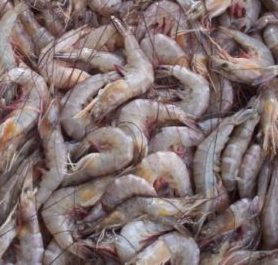 Against this diverse backdrop, the shrimping and energy industries stand out as particularly significant pillars of this economy, but ones that some environmentalists have increasingly tried to play at odds against each other. While the energy industry in Louisiana continues to grow, shrimpers have unfortunately struggled. Just a few years ago, local shrimpers were fetching nearly four dollars per pound of shrimp. But last year, locals said they were lucky to sell shrimp at $.80 per pound. As Louisiana Shrimp Association President Acy Cooper said, “shrimping is a way of life passed down through generations. It offered decent pay at one time, enough to provide for a family.” Never to let a good opportunity go to waste, environmental activists have taken to national news outlets to smear liquefied natural gas (LNG) companies for these issues, inaccurately accusing them of hindering local shrimping operations and running fishermen out of business. But the reality is that massive seafood imports mostly from Asia, not LNG projects, are the true cause of shrimpers current woes. Links, more, >>CLICK TO READ<< 12:02
Against this diverse backdrop, the shrimping and energy industries stand out as particularly significant pillars of this economy, but ones that some environmentalists have increasingly tried to play at odds against each other. While the energy industry in Louisiana continues to grow, shrimpers have unfortunately struggled. Just a few years ago, local shrimpers were fetching nearly four dollars per pound of shrimp. But last year, locals said they were lucky to sell shrimp at $.80 per pound. As Louisiana Shrimp Association President Acy Cooper said, “shrimping is a way of life passed down through generations. It offered decent pay at one time, enough to provide for a family.” Never to let a good opportunity go to waste, environmental activists have taken to national news outlets to smear liquefied natural gas (LNG) companies for these issues, inaccurately accusing them of hindering local shrimping operations and running fishermen out of business. But the reality is that massive seafood imports mostly from Asia, not LNG projects, are the true cause of shrimpers current woes. Links, more, >>CLICK TO READ<< 12:02
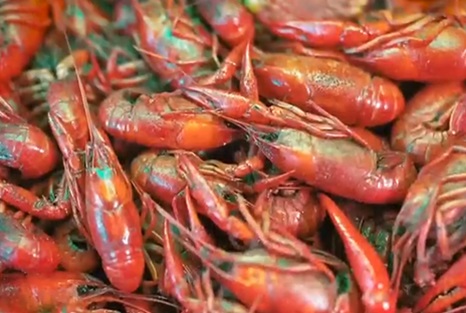
New law aims to support La. seafood industry
A new law is now in affect across the state requiring restaurants to provide transparency on where they are sourcing their seafood. Louisiana Law Act 148 became effective on Jan. 1 and requires restaurants that serve seafood to have the origins of their seafood listed on their menus. “We actually love the new law because we have been serving Louisiana crawfish and gulf shrimp our entire operation,” said Paige Vidrine at Steamboat Bill’s. “My mom started selling shrimp on the side of the road from shrimpers that were coming in from Hackberry and she bought her first dock there. That’s how Steamboat Bill’s came to be – from shrimping. So, it’s something integral in our culture and it’s something we will always love to support our local American farmer.” more, >>CLICK TO READ<< 08:533
Multiple restaurants found mislabeling Gulf shrimp | So why do they remain anonymous?
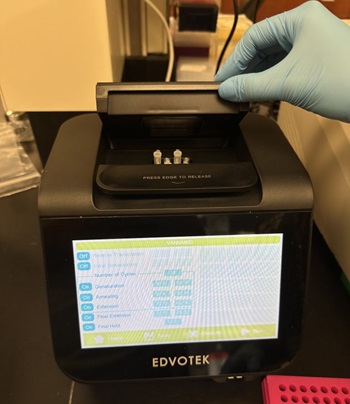 Shrimp and seafood lovers in and around Louisiana and the Gulf Coast may have seen a recent report from SeaD Consulting, a company that does genetic testing of seafood, monitoring for mislabeling and substitution fraud in the industry. In the first in a series of investigations across the state, the company sampled menu items at 24 restaurants in Baton Rouge, discovering that more than one in four dishes sampled were misrepresented. A new law taking effect January 1 will require Louisiana restaurants to clearly state the country of origin of the shrimp and crawfish they sell. If found in violation, restaurants could face thousands of dollars in fines. more, >>CLICK TO READ<< 09:43
Shrimp and seafood lovers in and around Louisiana and the Gulf Coast may have seen a recent report from SeaD Consulting, a company that does genetic testing of seafood, monitoring for mislabeling and substitution fraud in the industry. In the first in a series of investigations across the state, the company sampled menu items at 24 restaurants in Baton Rouge, discovering that more than one in four dishes sampled were misrepresented. A new law taking effect January 1 will require Louisiana restaurants to clearly state the country of origin of the shrimp and crawfish they sell. If found in violation, restaurants could face thousands of dollars in fines. more, >>CLICK TO READ<< 09:43
‘Tariffs not enough’ to save U.S. shrimping industry
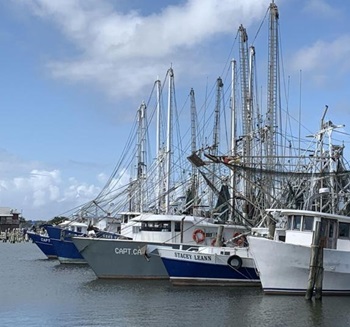 Alan Gibson, president of Tideland Seafood, summed up the frustration at a recent Louisiana Shrimp Task Force hearing in Houma. “Tariffs aren’t enough,” Gibson said. “The decrease in import prices is because of oversupply. They’re competing against each other to sell market share, and we’re fighting them, who are fighting each other.” Gibson called for a 25% import quota, saying it could reduce foreign competition enough to restore balance to the market. David Chauvin, a Louisiana-based seafood company owner, highlighted the disparity. Unlike tariffs, quotas directly limit the volume of imports, addressing the core issue of oversupply. By restricting imports, a quota could help stabilize domestic shrimp prices, allowing U.S. producers to compete more effectively. more, >>CLICK TO READ<< 16:58
Alan Gibson, president of Tideland Seafood, summed up the frustration at a recent Louisiana Shrimp Task Force hearing in Houma. “Tariffs aren’t enough,” Gibson said. “The decrease in import prices is because of oversupply. They’re competing against each other to sell market share, and we’re fighting them, who are fighting each other.” Gibson called for a 25% import quota, saying it could reduce foreign competition enough to restore balance to the market. David Chauvin, a Louisiana-based seafood company owner, highlighted the disparity. Unlike tariffs, quotas directly limit the volume of imports, addressing the core issue of oversupply. By restricting imports, a quota could help stabilize domestic shrimp prices, allowing U.S. producers to compete more effectively. more, >>CLICK TO READ<< 16:58
Louisiana Shrimpers face crisis as cheap imports threaten $1.3 billion industry
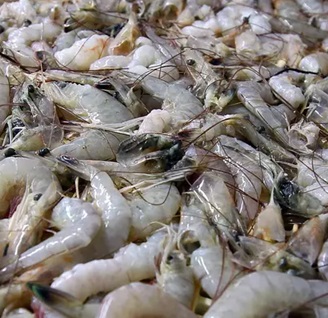 Louisiana’s shrimp industry, an essential part of the state’s economy and cultural identity, is under serious threat. A flood of cheap imported shrimp is driving prices to record lows, leaving local shrimpers fighting to survive. Without swift action, this generations-old way of life could vanish, taking with it jobs, traditions, and a vital piece of Louisiana’s coastal economy. Family-owned shrimping businesses, often passed down through generations, are struggling to stay afloat. The combination of plummeting prices and rising costs is forcing many to consider leaving the industry altogether. The potential collapse of the shrimping industry would devastate coastal towns like Grand Isle, Delcambre, and Pointe à la Hache, where much of the local economy depends on shrimping.
Louisiana’s shrimp industry, an essential part of the state’s economy and cultural identity, is under serious threat. A flood of cheap imported shrimp is driving prices to record lows, leaving local shrimpers fighting to survive. Without swift action, this generations-old way of life could vanish, taking with it jobs, traditions, and a vital piece of Louisiana’s coastal economy. Family-owned shrimping businesses, often passed down through generations, are struggling to stay afloat. The combination of plummeting prices and rising costs is forcing many to consider leaving the industry altogether. The potential collapse of the shrimping industry would devastate coastal towns like Grand Isle, Delcambre, and Pointe à la Hache, where much of the local economy depends on shrimping.
more,>>CLICK TO READ<< 08:52
Coast Guard investigating death on fishing boat
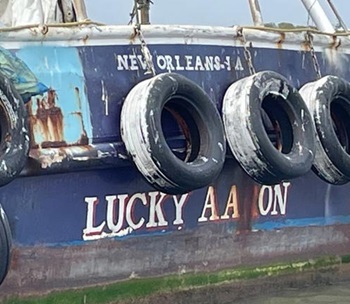 The US Coast Guard is investigating the death of a 61-year-old man linked to an injury onboard a fishing boat in the Gulf of Mexico, and Justice of the Peace Joseph Guillory II says the crew reports the man became entangled in some fishing equipment. The Coast Guard spokesman tell KFDM/Fox 4 News Coast Guard Sector Houston-Galveston requested a medevac early Sunday morning from the fishing vessel “Lucky Aaron” about 85 nautical miles southeast of Sabine Pass in Louisiana waters. There was a reported injury, according to the Coast Guard. The man was unconscious, and the crew couldn’t detect a pulse. The vessel was en route to Sabine Pass at 3:30 a.m. It arrived late Sunday morning. more, >>CLICK TO READ<< 06:29
The US Coast Guard is investigating the death of a 61-year-old man linked to an injury onboard a fishing boat in the Gulf of Mexico, and Justice of the Peace Joseph Guillory II says the crew reports the man became entangled in some fishing equipment. The Coast Guard spokesman tell KFDM/Fox 4 News Coast Guard Sector Houston-Galveston requested a medevac early Sunday morning from the fishing vessel “Lucky Aaron” about 85 nautical miles southeast of Sabine Pass in Louisiana waters. There was a reported injury, according to the Coast Guard. The man was unconscious, and the crew couldn’t detect a pulse. The vessel was en route to Sabine Pass at 3:30 a.m. It arrived late Sunday morning. more, >>CLICK TO READ<< 06:29
Fewer fish spills reported after Louisiana pushes pogy boats from coast
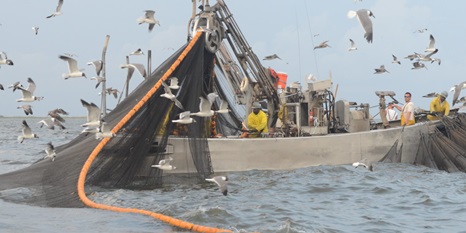 In 2022, a menhaden fishing ship and its net boats spilled about a million fish off the Louisiana coast, leaving the floating mass to rot in the summer sun. A few months later, another spill blanketed Louisiana beaches with an estimated 850,000 dead fish. The two incidents pushed the state’s leaders to enact the first significant restrictions on the Gulf of Mexico’s largest but least-regulated fishery. Starting this year, catchers of menhaden, a foot-long fish with a host of industrial uses, must stay a half mile from much of the Louisiana coast and a mile from three ecologically sensitive areas. But the menhaden industry says better nets rather than bigger buffers have played a far bigger role in reducing spills. Photos, more, >>CLICK TO READ<< 09:44
In 2022, a menhaden fishing ship and its net boats spilled about a million fish off the Louisiana coast, leaving the floating mass to rot in the summer sun. A few months later, another spill blanketed Louisiana beaches with an estimated 850,000 dead fish. The two incidents pushed the state’s leaders to enact the first significant restrictions on the Gulf of Mexico’s largest but least-regulated fishery. Starting this year, catchers of menhaden, a foot-long fish with a host of industrial uses, must stay a half mile from much of the Louisiana coast and a mile from three ecologically sensitive areas. But the menhaden industry says better nets rather than bigger buffers have played a far bigger role in reducing spills. Photos, more, >>CLICK TO READ<< 09:44
Photos: Louisiana Shrimp Fest/ Shrimp Aid brings attention to the struggling local shrimp industry
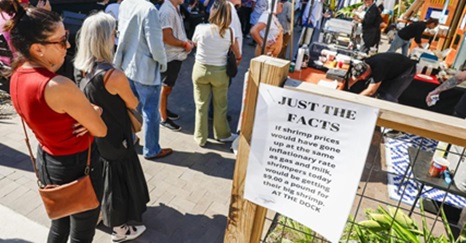 The Louisiana Shrimp Fest/ Shrimp Aid was held at the Broadside in New Orleans on Sunday. Local chefs and coastal organizations put on the new festival to bring attention to the struggling local shrimp industry and the people effected. Dishes with local caught shrimp were served by a variety vendors as musician performed on the stage. Panel discussions with shrimpers and people involved in the industry stressed the need for consumers to ask where their shrimp comes from and to demand locally caught shrimp. Photos, more, >>CLICK TO READ<<08:39
The Louisiana Shrimp Fest/ Shrimp Aid was held at the Broadside in New Orleans on Sunday. Local chefs and coastal organizations put on the new festival to bring attention to the struggling local shrimp industry and the people effected. Dishes with local caught shrimp were served by a variety vendors as musician performed on the stage. Panel discussions with shrimpers and people involved in the industry stressed the need for consumers to ask where their shrimp comes from and to demand locally caught shrimp. Photos, more, >>CLICK TO READ<<08:39
Louisiana lawmaker grills Shrimp & Petroleum Festival for selling imported shrimp
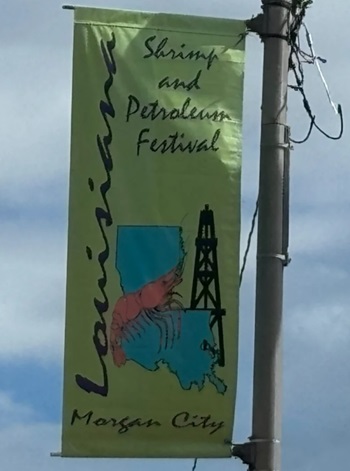 A state lawmaker has issued a scathing rebuke of what she characterized as an embarrassing and “misleading” response from the Louisiana Shrimp & Petroleum Festival after the Illuminator reported that multiple vendors sold imported shrimp at this year’s event. State Rep. Jessica Domangue, R-Houma, wrote an open letter to festival organizers that she posted Thursday on Facebook. “Growing up in St. Mary Parish in a family of generations of commercial shrimpers, I was appalled to learn of the widespread selling of imported shrimp at the Louisiana Shrimp & Petroleum Festival,” Domangue wrote. “I found the festival’s official response in an October 1 press release to be an embarrassment.” The testing was performed at the five-day festival over the Labor Day weekend by Sea D Consulting, a food safety technology company that recently developed a rapid seafood species identification test in collaboration with Florida State University microbiologist Prashant Singh. more, >>CLICK TO READ<< 12:32
A state lawmaker has issued a scathing rebuke of what she characterized as an embarrassing and “misleading” response from the Louisiana Shrimp & Petroleum Festival after the Illuminator reported that multiple vendors sold imported shrimp at this year’s event. State Rep. Jessica Domangue, R-Houma, wrote an open letter to festival organizers that she posted Thursday on Facebook. “Growing up in St. Mary Parish in a family of generations of commercial shrimpers, I was appalled to learn of the widespread selling of imported shrimp at the Louisiana Shrimp & Petroleum Festival,” Domangue wrote. “I found the festival’s official response in an October 1 press release to be an embarrassment.” The testing was performed at the five-day festival over the Labor Day weekend by Sea D Consulting, a food safety technology company that recently developed a rapid seafood species identification test in collaboration with Florida State University microbiologist Prashant Singh. more, >>CLICK TO READ<< 12:32








 Act 148 of the 2024 regular legislative session brought sweeping changes to laws affecting restaurants and other food establishments in an effort to protect Louisiana’s struggling domestic seafood industry. However, the new law, which took effect Jan. 1, could undergo some clarification revisions when lawmakers reconvene this spring. At issue are several provisions concerning menu and labeling requirements. One provision in the new law requires any food service establishment that serves foreign crawfish or shrimp to print a disclaimer on its menu: “Some items served at this establishment may contain imported crawfish or shrimp. Ask for more information.” If the establishment does not use a menu, it must print the disclaimer on a sign at the entrance of the establishment.
Act 148 of the 2024 regular legislative session brought sweeping changes to laws affecting restaurants and other food establishments in an effort to protect Louisiana’s struggling domestic seafood industry. However, the new law, which took effect Jan. 1, could undergo some clarification revisions when lawmakers reconvene this spring. At issue are several provisions concerning menu and labeling requirements. One provision in the new law requires any food service establishment that serves foreign crawfish or shrimp to print a disclaimer on its menu: “Some items served at this establishment may contain imported crawfish or shrimp. Ask for more information.” If the establishment does not use a menu, it must print the disclaimer on a sign at the entrance of the establishment. 